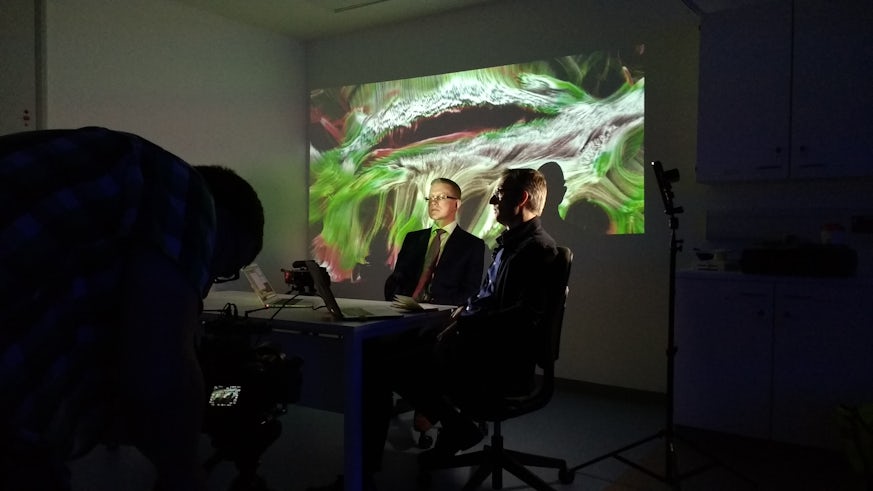The most detailed scan of the wiring of the human brain
11 July 2017

An incredible new film shows the human brain in unrivalled detail, thanks to a partnership between Cardiff University and Siemens Healthineers.
BBC Medical Correspondent Fergus Walsh's brain was scanned at Cardiff University Brain Research Imaging Centre (CUBRIC) using Europe’s most powerful MRI scanner – the Magnetom Skyra Connectom 3T.
Cinematic rendering
Siemens Healthineers used the scan data to produce amazing images of Fergus’s brain by adapting a technique used in the film industry known as cinematic rendering. These images provide a stunning new view of the pathways taken by the white matter, revealing the complex set of connections that underpin brain function.
Another volunteer to be scanned was Sian Rowlands who has multiple sclerosis. Conventional scans clearly show lesions - areas of damage - in the brain of MS patients. But the advanced scan, showing axonal density, can help explain how the lesions affect motor and cognitive pathways - which can trigger Sian's movement problems and extreme fatigue.
Professor Derek Jones, Director of CUBRIC, said: “The incredible detail shown in these scans highlight the possibilities available to the talented CUBRIC team which now has access to the most advanced equipment of its type in the world.
“The microstructural scanner will be used for research that will potentially have a profound positive impact on the lives of people around the world…”

“At CUBRIC we are looking to provide unprecedented insights into the causes of neurological and psychiatric conditions such as dementia, schizophrenia and multiple sclerosis, as well as understanding the workings of the normal, healthy brain.”
CUBRIC brings together expertise that has established Cardiff University as one of the UK’s top three universities in the UK for Psychology, Psychiatry and Neuroscience, alongside Oxford and Cambridge universities.
The best neuroimaging equipment in the world

The £44 million Centre, designed by global architecture and technology practice IBI Group, and built by construction firm BAM, is four times larger than the University's previous brain research imaging facilities. It houses the best neuroimaging equipment in the world to help unravel the mysteries of the human brain.
The new facility has been part-funded by the Engineering and Physical Sciences Research Council (EPSRC), the European Regional Development Fund through the Welsh Government, the Medical Research Council (MRC), the Wellcome Trust, the Welsh Government and the Wolfson Foundation.
Together, these investments are supporting innovation in world-class brain imaging research, including the creation of highly-skilled research jobs in Wales.
Share this story
Our brain scanning facilities are located in the Cardiff University Brain Research Imaging Centre (CUBRIC).




